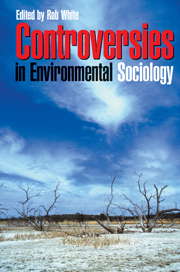Book contents
- Frontmatter
- Contents
- Tables and Figures
- Author Notes
- Abbreviations
- Introduction: Sociology, Society and the Environment
- PART I SOCIAL PERSPECTIVES
- PART II SOCIAL TRENDS
- 6 When the Population Clock Stops Ticking
- 7 Inequality, Social Differences and Environmental Resources
- 8 Sustainable Technology: Beyond Fix and Fixation
- 9 Think Global, Act Local
- 10 Citizenship and Sustainability
- 11 The Environment Movement
- PART III SOCIAL ISSUES
- Index
- References
7 - Inequality, Social Differences and Environmental Resources
Published online by Cambridge University Press: 05 June 2012
- Frontmatter
- Contents
- Tables and Figures
- Author Notes
- Abbreviations
- Introduction: Sociology, Society and the Environment
- PART I SOCIAL PERSPECTIVES
- PART II SOCIAL TRENDS
- 6 When the Population Clock Stops Ticking
- 7 Inequality, Social Differences and Environmental Resources
- 8 Sustainable Technology: Beyond Fix and Fixation
- 9 Think Global, Act Local
- 10 Citizenship and Sustainability
- 11 The Environment Movement
- PART III SOCIAL ISSUES
- Index
- References
Summary
What happens when ‘environmentalism’ meets the ‘politics of difference’? At the very least, an intellectually and politically exciting aspect of environmental sociology comes into view, one that focuses on issues of ‘environmental justice’. The issues that become visible at such a point of intersection pose a radical challenge to mainstream understandings of environmentalism, offer a powerful critique of contemporary (capitalist) social relations, and highlight the need to develop a new form of transformative politics in the ‘age of globalisation’.
The postmodernist/post-structuralist turn in sociology has forced sociologists, somewhat belatedly, to take issues of ‘difference’ seriously in the analysis of social process. The trend here has been towards a focus on the ‘politics of identity’ with its insistence on the importance of listening to the voices of the ‘other’: ethnic and racial minorities, women, and people with disabilities. While this field of sociology examines power relations, projects within this genre typically aim to uncover the underlying relations of domination and subordination through deconstruction. In doing so, they demonstrate the heterogeneous, fragmented, and ultimately contingent nature of social life. These insights, which illuminate the flux and flow of social life, are crucial for a sound understanding of the complexities of contemporary societal conditions. There is a tendency in many of these studies, however, to avoid grounding analysis in the material conditions of the ‘other’.
- Type
- Chapter
- Information
- Controversies in Environmental Sociology , pp. 113 - 131Publisher: Cambridge University PressPrint publication year: 2004



